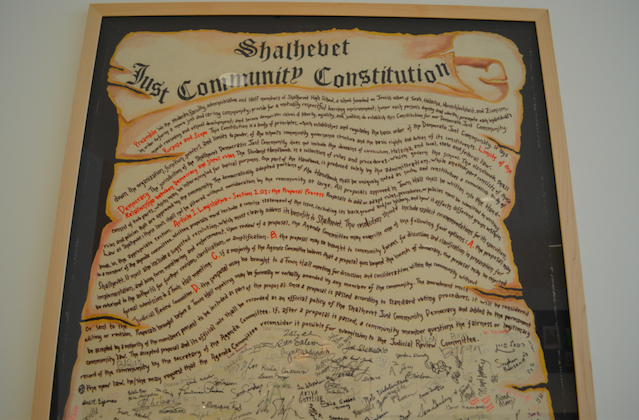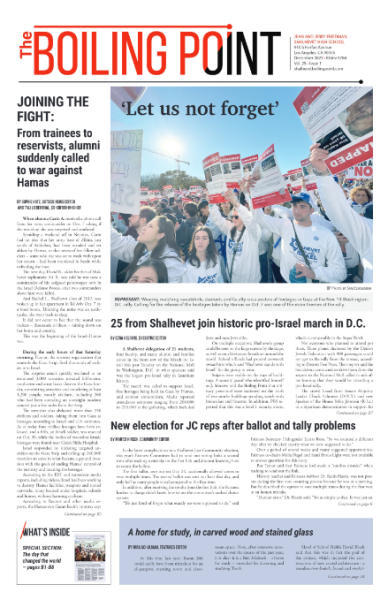Original Shalhevet Constitution: Complete Text
SIGNED: Shalhevet’s original Just Community Constitution was signed by students, faculty and administrators in 2002.
May 18, 2016
Source: Dr. Samuel Gomberg, Former General Studies Principal and Director of Moral Education
Shalhevet Just Community Constitution
Preamble
We the students, faculty, administration and staff members of Shalhevet High School, wish to establish a school formed on Jewish values of Torah, Halacha, Menschlechkeit, and Zionism, in order to form a more just and caring community; provide for a mutually respectful learning environment; honor each person’s dignity and worth; promote each individual’s moral reasoning and ethical development; secure democratic values of liberty, equality, and justice; and uphold the principles set forth in this Constitution for our Democratic Just Community.
Purpose and Scope
Purpose
This Constitution is a body of principles, which establishes and regulates the basic order of the Democratic Just Community. It lays down the organization, function, powers, and limits to power, of the school’s community governance structure and the basic rights and duties of its constituents.
Limits of the Democracy
The jurisdiction of the Shalhevet Democratic Just Community does not include the domains of curriculum, halacha, and local, state and federal law.
Relationship between Democracy and school rules
The Student Handbook is a collection of rules and procedures, which govern the school. The handbook shall consist of two parts, which may be intermingled for topical purposes. One part of the handbook is produced solely by the administration, while another part consists of those rules and policies that are approved by the community. The democratically adopted portions of the Handbook shall be uniquely noted as such, and constitutes a cumulative body of Law at Shalhevet: these laws shall not be altered without consideration by the community at large.
All proposals approved in Town Hall, shall be written into the Handbook in the appropriate section.
Article I. Legislative
Section 1.01: The Proposal Process
Proposals to adapt or to add rules, procedures, or policies must be submitted in writing to a member of the Agenda Committee. Written proposals must include a concise statement of the issue, including its background and/or history, and how it affects different groups within Shalhevet. It must also include a suggested resolution, which must clearly address its benefits to the Shalhevet Community. The resolution should include explicit recommendations for its execution, implementation, and long term monitoring and enforcement.
Upon review of a proposal, the Agenda Committee may exercise one of the following four options:
- The proposal may be returned to the author(s) for further revision, clarification, or amplification.
- The proposal is brought to Community Forums for discussion and clarification in preparation for formal submission to a Town Hall meeting.
- If a majority of the Agenda Committee believes that a proposal goes beyond the bounds of democracy, the proposal may be rejected or sent to the Judicial Review Committee.
- The proposal is brought to a Town Hall meeting for discussion and consideration within the community without editing or revision.
Proposals brought before a Town Hall meeting may be formally or verbally amended by any member of the community. The amendment must be accepted by a majority of the members present to be included as part of the proposal.
Once a proposal is passed according to standard voting procedures, it will be considered community law. The accepted proposal and its official vote shall be recorded as an official policy of the Shalhevet Just Community Democracy and added to the permanent record of the community by the secretary of the Agenda Committee.
If, after a proposal is passed, a community member questions the fairness or legitimacy of the new law, he/she may request that the Agenda Committee reconsider it for possible submission to the Judicial Review Committee.
Section 1.02: The Agenda Committee
In order to affect the democratic processes regarding rights, privileges and responsibilities, the Agenda Committee shall be elected as community representatives and officers to represent community concerns and proposals for school policies. These proposals are discussed at Agenda Committee meetings and then presented at the following Town Hall meeting for discussion, and possibly, a vote. The Agenda Committee collects, drafts, and helps to clarify with the author(s), proposals to be discussed during regularly scheduled Community Forums and/or Town Hall meetings, drafts proposals for Town Hall and conducts Town Hall Meetings, with the chair presiding.
The Agenda Committee shall be composed of a chairperson from the senior class, a vice chairperson from the senior or junior class, a secretary from the senior, junior, or sophomore class, two representatives from each grade, two faculty representatives, and a single administrative advisor.
The Agenda Committee shall meet at least once every five school days and must meet at least two school days before any Town Hall or Community Forum meeting. The Agenda Committee shall decide amongst itself how to conduct meetings. On a monthly basis, the Chair of the Agenda Committee will meet with the administration and the chairs of the other major committees to discuss current affairs. The secretary of the Agenda Committee is responsible for keeping a written record of all Agenda Committee and Town Hall meetings. An outline of the proposed discussion for each Town Hall meeting shall be kept in a file for reference from year to year. The records of each meeting shall be kept in a locked filing cabinet that will be accessible to any member of the community upon request.
In order to maintain constant communication with the Community, the Agenda Committee shall maintain an announcement board in the hallway on which a record of the most recently discussed Town Hall and any decisions made during that Town Hall will be posted. The records must be posted by the morning of the first school day after the Town Hall. On the school day prior to any Town Hall, the Agenda Committee shall give a brief announcement to the community describing its expected proceedings.
The following are the enumerated powers of the Agenda Committee:
- The committee shall have the power to decide the topic for the weekly Town Hall meetings.
- The committee shall have the power to ask for, accept, reject, and edit proposals from the community.
- The committee shall have the power, by a majority vote, to send a proposal to the Judicial Review Committee for deliberation on its appropriateness.
- The Agenda Committee has the power to administer Town Hall. Specifically, the Chair of the Agenda committee shall conduct Town Hall meetings, and the secretary of the Agenda Committee shall be the secretary of Town Hall.
Section 1.03: Town Hall
Proposals for the addition or adaptation of rules, procedures and policies shall be processed and executed in the school-wide Town Hall meetings, which are to convene once per calendar week, except during weeks where community forums take precedence. The leading of Town Hall shall fall primarily under the position and discretion of the Agenda Committee Chair.
The Agenda Committee Chair or his/her designee shall call each meeting to order. Town Hall meetings shall be structured and governed based upon “Robert’s Rules of Order.” Meetings will begin with an informative introduction, an open debate, and possibly a vote.
The Agenda Committee shall be responsible for keeping a written record of the proceedings of Town Hall, all approved proposals, and for the preservation and propagation of this record from year to year.
The Constructive Consequences Committee shall be responsible for overseeing the enforcement of proposals passed by Town Hall.
Section 1.04: Community Forum
In addition to Town Hall meetings, smaller groups of students and staff shall convene in Community Forums. These Community Forums shall encourage and foster student, teacher, and staff interaction on a smaller, more personal level than Town Hall. The Agenda Committee shall decide when and in what manner Community Forum meetings shall be initiated.
Section 1.05: Judicial Review Committee
If a proposal is deemed constitutionally questionable by a majority of the Agenda Committee, it shall be submitted to the Judicial Review Committee for consideration. The committee shall be comprised of two students, two faculty members, and the current Head of School. One of the student representatives shall be appointed Chair of the committee. Student and Faculty members must have served on The Agenda Committee or Fairness Committee for at least one term. Members of the Committee shall be elected by a community-wide ballot.
The Judicial Review Committee is required to meet only as necessary. In its meetings, the committee shall hear debate as to the constitutionality of the appealed proposal and rule within a week. The Chair is responsible for writing a summary of the arguments and decisions that will be presented to the community when a verdict is reached. The Judicial Review Committee has the power to label a proposal/law constitutional, unconstitutional, or in need of revision.
Article II. Fairness
Section 2.01: Community Rights:
- The Right to Fairness
All members of the community—administrators, teachers, staff, and students—have the right to expect fairness in the school policies and procedures. When there is a disagreement as to what is fair, the issue is taken to the Fairness Committee for resolution.
- The Right to Respect
All members of the community—administrators, teachers, staff, and students—have the right to be treated respectfully in speech and behavior. Disrespectful language or actions, dishonesty, and deception violate this basic tenet.
- The Right to be Heard
The right to be heard and to be taken seriously applies to all members of the community equally. “Being heard” is not the same as agreement. While each member of the community has this right, each member is responsible for allowing others their rights.
Section 2.02: Fairness committee
The purpose of the Fairness Committee is to hear and settle disputes in issues of perceived violations of the rights to fairness or respect. All outcomes of cases and judgments must be congruent with the Rights Clause of the Constitution.
The Fairness Committee shall be composed of two teacher representatives, and two student representatives from each grade. The chair, an elected senior, and the secretary of the committee are self-appointed. For any office, there will be open nominations. All those nominated will be placed on a ballot. Each grade will elect representatives from its own grade, and teachers will elect fellow teachers. The two nominees from each grade and the two teacher nominees with the most votes will serve on the committee.
The Fairness Committee is required to meet at least once every five school days. The Fairness Committee shall decide how to run its meetings. The secretary shall take notes of every meeting. A private record of each case shall be kept in the committee’s locked filing cabinet. Unlike the other committees, these files will not be open to the public under any circumstances.
In order to maintain constant communication with the community, the Fairness Committee can utilize Town Hall/Community Forum meetings, with the discretion of the Agenda Committee, to address the school. The chair of the Fairness Committee shall meet with the chairs of the other major committees and the administration monthly to discuss current affairs.
Any member of the community has the right to bring any other member of the community to the Fairness Committee. The Fairness Committee is not required to hear every case. Once a case is heard the Fairness Committee can impose non-punitive remedies, suggest punishments, or bring notice of a student or teacher’s unfair actions to the administration.
Article III. Enforcement
Section 3.01: Constructive Consequences Committee (CCC)
The purpose of the Constructive Consequences Committee is to allow a group of community representatives to assign just and constructive punishments to members of the community who act in violation of the Rights clause of the Constitution.
The CCC shall be composed of one representative from each grade, a teacher representative, an appointed secretary from the 10th or 11th grade, and a Chairperson from 12th grade. For any office, there will be open nominations. All those nominated will be placed on a ballot. Each grade will elect representatives from its own grade, and teachers will elect fellow teachers. The nominee from each grade with the most votes will serve on the committee.
The CCC is required to meet at least once every five school days and may meet more often if cases require. The CCC shall decide how to run its meetings. The appointed secretary shall take notes of every meeting. Records of the meetings shall be kept in a locked cabinet that is accessible to the public with the discretion of the committee.
In order to maintain constant communication with the community, the CCC can utilize Town Hall/community meetings, with the discretion of the Agenda Committee, to address the school. The chair of the Constructive Consequences Committee shall meet with the chairs of the other major committees and the administration monthly to discuss current affairs. At the end of every semester, the CCC shall meet with the administration to discuss its actions in the past semester.
Both the Fairness Committee and the administration can bring a case to the CCC to construct an appropriate punishment. The CCC must oversee the execution of the consequences it constructs.
Article IV. Amendment Process
In order to amend the Constitution, the following steps must be taken:
- A written proposal must be submitted to the Agenda Committee.
- The Agenda Committee must approve the proposal by a 2/3 written ballot.
- One full Town Hall must be devoted to discussing the proposal, without a vote.
- The community must approve the proposed amendment by a ¾ written ballot.
Article V. Ratification
In order to ratify the Constitution, a Constitutional Convention must be held. The first part of the Convention shall be a public address and explanation of the Constitution. For the following weeks, small group meetings will be held to edit the Constitution. After a detailed analysis, the Constitution Committee will siphon all edits into a final draft. The new draft will be voted on in Town Hall. The Constitution will be ratified by a ¾ vote by the entire community.













